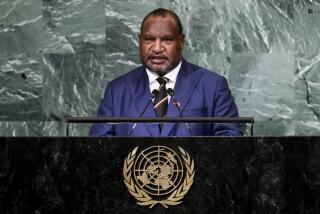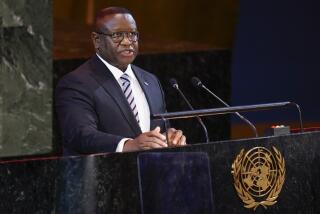4 Killed in Mutiny, Lesotho Reports; Border ‘Blockade’ by South Africa Continues
- Share via
JOHANNESBURG, South Africa — A military mutiny was crushed Saturday in the small mountain kingdom of Lesotho after two days of clashes that left at least four people dead, government officials in the capital of Maseru said.
Desmond Sixishe, Lesotho’s information minister, said by phone from Maseru that 35 soldiers from the 3,000-member paramilitary force that serves as the country’s army, had rebelled and fought back when other troops sought to disarm them.
The fighting, which began Friday afternoon at an army barracks south of Maseru and later spread to other areas around the capital, climaxed a week of political turmoil in Lesotho. The troubles were sparked by a virtual blockade of the country by South Africa, which surrounds it and has all but halted shipments of food, fuel, medicine and other goods in and out since Jan. 1.
Sixishe said that two rebels and two loyal soldiers were killed in the clashes and that a number of others were wounded. Foreign residents in Maseru said, however, that at least eight people were killed and that the capital remained tense. South African news media put the number of deaths as high as 17.
Sixishe, lifting a news blackout on the mutiny, would give no details of the fighting nor of the events that led up to it. He said that of the 35 rebels, two were killed, 23 surrendered or were captured and 10 were still being sought. He said he did not know the whereabouts of the rebel leaders, a colonel and a major.
“While some of those members of the paramilitary force who refused to obey orders remain at large and are being pursued, the incident is basically over,” Sixishe said. “Its importance should not be exaggerated. The stability of the government was not at stake. No coup d’etat was attempted.”
Sixishe said the mutiny stemmed largely from differences over military policy between Maj. Gen. Justin Lekhanya, commander of the paramilitary unit, and the two officers who led the rebels. But well-informed political sources in Maseru said the underlying issue was the continued leadership of the country by Chief Leabua Jonathan, the prime minister for the past 20 years.
A related issue, these sources said, was the growing rivalry between the politically conservative paramilitary force, which has recently been doubled in size, and the ruling Basotho National Party’s leftist Youth League, which has been trained by North Korean advisers, is armed and has allegedly been used to bully Jonathan’s opponents.
Stranglehold Tightens
Maseru politicians said strong feelings have developed in the paramilitary force that Jonathan, 71, whose power was once unchallengeable, has grown old, frail and politically weak, too dependent on the Youth League and unwilling to stand up to it.
As South Africa tightens its stranglehold on the small country, which has a population of only 1.5 million and is economically dependent on its large neighbor, the military reportedly has pressed Jonathan to take a much more conciliatory approach toward the minority-white regime in Pretoria and perhaps accede to its demand to oust all members of the African National Congress.
But the Youth League demanded recently that Jonathan take an even tougher stand on apartheid and give more support to the African National Congress, the main guerrilla organization fighting the Pretoria government.
On Wednesday, Youth League members stormed into Jonathan’s office with a petition calling for the ouster of several Cabinet members, a tougher line toward South Africa and increased support for the congress.
This brought about 150 soldiers to the central government offices, and the youths were chased away. The government explained these events as a routine precaution after a bomb threat as rumors circulated that there had been a coup attempt.
These events apparently intensified the power struggle over Jonathan’s autocratic leadership and set the stage for a showdown between the paramilitary force and the Youth League.
Sixishe acknowledged late last week that there had been some serious “misunderstandings” between the Youth League and the paramilitary force but said that these were not on political issues but “other matters,” presumably the arming of Youth League members as a militia for the Basotho National Party.
Although Sixishe said Saturday that the fighting Friday and Saturday was confined to factions of the Lesotho paramilitary force, well-informed political observers in Maseru said that most of the rebels belonged to a Youth League branch within the paramilitary unit. Of the 17 dead reported by South African news media, about half were described as Youth League members.
Earlier in the week, the government detained five opposition politicians for investigation on suspicion of treason after three of them met with Roelof F. (Pik) Botha, South Africa’s foreign minister, to discuss the badly strained relations between the two countries.
South Africa contends that the African National Congress is using Lesotho, despite its denials, as a base from which to recruit and train guerrillas and then infiltrate them back into South Africa.
Pretoria’s basic condition for lifting its blockade is the ouster of all African National Congress members from Lesotho, a demand that any government in Maseru would have trouble fulfilling. Lesotho agreed on Friday, however, to establish a special security committee to discuss this and related questions this week.
More to Read
Sign up for Essential California
The most important California stories and recommendations in your inbox every morning.
You may occasionally receive promotional content from the Los Angeles Times.












